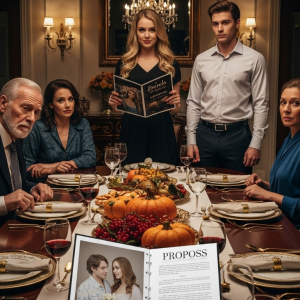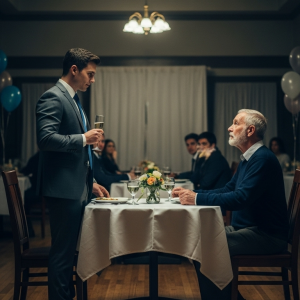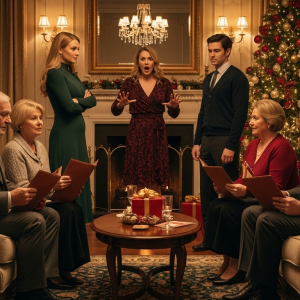The memory of the night Officer Jack Doyle died was a cold echo in a hollowed-out part of Mike Wallace’s soul. It wasn’t the violence that haunted him most, but the details. The acrid smell of burnt cordite mixed with damp city asphalt. The lonely, warbling siren growing closer. The impossible stillness of his partner’s body.
And the flower.
There, on the grimy, oil-stained pavement, just inches from the spreading pool of blood, lay a single, perfect gardenia. It was impossibly white, its petals unbruised, as if it had been placed there with deliberate care after the chaos. It was a detail so bizarre, so out of place, that it was seared into Mike’s memory more vividly than the killer’s fleeting shadow.
It was the one detail they never released to the public. It was their ghost, their secret clue that led nowhere. The official narrative was a robbery gone wrong, a tragic, random act of violence that left a good cop dead and a case file that gathered dust. But Mike knew, with a certainty that gnawed at him for years, that it wasn’t random. The gardenia was a message.
Years passed. The case went cold, but Mike’s obsession remained, a low-grade fever that never broke. He was a good cop, a respected officer in the 27th Precinct, but a part of him had died with Jack. He saw the city not as a place to protect, but as a puzzle he couldn’t solve, a wound that wouldn’t close.
His beat included the long-forgotten Northwood Park, a one-acre square of urban decay. It was a graveyard of rusted swing sets and a broken merry-go-round, its surfaces covered in the angry, overlapping hieroglyphs of gang graffiti. It was a place where hope had been officially pronounced dead.
And it was there he first saw the boy.
The kid was maybe fifteen, wiry and tense, with eyes that were far too old. He had a sketchbook in his hand but was trying to hide it, to affect an air of tough indifference. Mike knew the look. He was a good kid trying to survive in a place that rewarded the bad. The local gang, the Vipers, were circling him like vultures, their leader, a slick predator named Rico, offering a sense of belonging that the world had denied him.
Mike saw the boy, who the other kids called Leo, and he saw the park, and he saw the cold case file for Jack Doyle, and for the first time in years, the separate, aching pieces of his life seemed to blur into one single, overwhelming problem: a world left to rust.
The following Saturday, Mike Wallace did not put on his uniform. He put on a pair of old, paint-splattered jeans and a worn-out NYPD t-shirt. He went to the hardware store and spent two hundred dollars of his own money on wire brushes, primer, and several cans of bright, optimistic blue and yellow paint.
He drove his pickup to Northwood Park and started working. He didn’t make a speech. He didn’t ask for help. He just began the quiet, back-breaking labor of scraping rust from a swing set chain.
The neighborhood watched him with suspicion. Kids on bikes slowed down, their eyes wide and questioning. Old women peered from behind their curtains. Rico and his Vipers stood at the edge of the park, arms crossed, their expressions a mixture of mockery and curiosity. A cop, on his day off, cleaning up their turf? It didn’t make sense.
Leo was there, perched on a broken bench, sketching in his book. He watched Mike for hours, his pencil still. He saw the sweat dripping from the officer’s brow, the grim determination in his jaw. This wasn’t a PR stunt. This was something else. This was penance.
For three days, Mike worked alone. He scraped, he sanded, he primed. The screech of metal on metal was the only sound in the park. On the fourth day, as Mike was opening a can of sunshine-yellow paint, Leo walked over. He didn’t say anything at first, just stood there, his worn-out sneakers scuffing the dirt.
“What’s the point?” Leo finally asked, his voice laced with the practiced cynicism of a teenager who had never been given a reason to hope.
Mike didn’t stop stirring the paint. “What’s the point of any of it?” he answered, his voice tired. “Of letting it all just fall apart? This place should be for kids, not for… this.” He gestured at the gang graffiti covering a nearby wall.
Leo looked at the wall, then down at his own sketchbook, filled with vibrant, complex designs. He was a graffiti artist, a tagger. But his work was different. It was art, not just anger.
“That’s just tagging,” Leo said quietly. “It’s ugly. I could do better.”
Mike finally stopped and looked at him, really looked at him, for the first time. He saw the talent simmering beneath the tough exterior. “Yeah?” Mike said, a challenge in his voice. “Show me.”
That was the beginning. Leo went home and came back with a detailed design for a massive mural, a sprawling, colorful piece that depicted the neighborhood not as it was, but as it could be. It was a masterpiece of hope and imagination.
Mike bought him the paint, every color he asked for. And as Leo’s mural began to take shape, covering the ugly gang tags with soaring birds and smiling faces, a strange and wonderful thing happened. The neighborhood woke up.
First, an old man came out with a lawnmower and cut the overgrown grass. Then, a group of mothers arrived with trash bags and began clearing years of debris. Teenagers who once loitered now picked up paint rollers. Rico and his Vipers, seeing their influence literally being painted over, faded back into the shadows, their power diminished.
The park became a construction site of hope, and at its center were the unlikely pair: the grieving cop and the gifted kid from the wrong side of the tracks.
They worked side-by-side for weeks, transforming the space. They built a father-son bond without ever calling it that. They talked about everything and nothing. Leo talked about his dreams of being an artist. Mike talked about the job, the frustrations, the small victories.
One evening, as they were finishing the last section of the mural, the conversation took a somber turn. It was the anniversary of Jack Doyle’s death, and the grief was heavy on Mike’s shoulders.
He found himself telling Leo about his old partner, about the kind of cop he was, the kind of man. He spoke of the case, of the frustration of a trail gone cold.
“They never found who did it,” Mike said, his voice thick with emotion. “The scene was a mess. They left nothing behind. Nothing but…” He hesitated, the secret detail rising in his throat. He had never told anyone who wasn’t a cop.
But looking at Leo, this kid who had helped him reclaim a piece of his own soul, he felt a sudden need to share the weight of it.
“There was a flower,” Mike whispered, the words feeling strange in the open air. “A gardenia. Perfect. Lying right there on the pavement. We never told the press. It was our one secret, our one clue that meant nothing. Who leaves a gardenia at a murder?”
Leo listened, his expression serious. He didn’t offer empty platitudes. He just nodded, absorbing the older man’s pain, filing away the strange, sad detail. He was storing a piece of his mentor’s story, a secret shared in trust.
A decade is a lifetime in a neighborhood like Northwood. The park Mike and Leo had resurrected became the heart of the community. The mural was a local landmark. Where drug dealers once lurked, children now played. The Vipers had lost their grip, their recruitment ground turned into a sanctuary.
Leo had become the park’s greatest success story. His talent, nurtured by Mike’s belief in him, had earned him a scholarship to a prestigious art school. Now, at twenty-five, he was a successful graphic designer, his work featured on billboards and in magazines. He was a testament to the power of a single act of kindness.
Mike was now Sergeant Wallace, a respected veteran of the force. He was proud of Leo, proud of the park, proud of the community. But the cold echo of Jack’s murder remained. The case file, now thick with a decade of dead ends, still sat on the corner of his desk, a monument to his one great failure.
He had found a measure of peace in building a better future for kids like Leo, but he had never found justice for the past. The man who had shot his partner, the man who had left a gardenia as his calling card, was still out there.
The call came on a Tuesday night. Mike was at home, staring at a cold cup of coffee and the colder case file, when his phone rang. It was Leo. His voice was different—not the calm, confident tone of the successful artist, but the tense, urgent whisper of the kid from the old neighborhood.
“Sarge? It’s Leo,” he said, his voice low. “You need to listen to me. I’m at a bar downtown, a real dive. I was meeting a client, and he stood me up. But I’m sitting here, and I just overheard something. Something crazy.”
Mike sat up straight, his cop instincts kicking in. “What is it, Leo? Are you in trouble?”
“No, I’m fine,” Leo said, his voice trembling slightly. “But these guys next to me… they’re Vipers, old-timers. One of them, a real loudmouth, is drunk and trying to impress some girl. He’s telling stories about his boss.”
“What kind of stories?” Mike asked, his patience wearing thin.
“Stories about how tough his boss is. How he’s been running things for years, untouchable,” Leo continued, his words coming faster now. “And then he said it. He said, ‘The old man is a ghost. Nobody ever connected him to that cop he took out a decade ago. The one over on Franklin.’ He’s talking about your partner, Mike. I know he is.”
Mike’s blood ran cold. “Leo, that’s not enough. A drunk gangster bragging is not evidence.”
“I know, I know,” Leo said, his voice dropping to a near-whisper. “But then he said the thing. The detail. The loudmouth, he laughed and said, ‘The boss is a real artist. Popped the cop, and what does he do? Leaves his trademark. A damn flower. Said it looked like a gardenia or something.’ Mike… how? How would he know that?”
The world stopped. The cold echo in Mike’s soul suddenly became a deafening roar. The gardenia. The secret he had shared with only one other civilian in the world, a trust placed in a fifteen-year-old boy with a can of spray paint. That trust, nurtured over years, had just circled back to him, carrying the key.
“Leo,” Mike said, his voice dangerously calm. “Where are you? And who is this loudmouth’s boss?”
Leo told him the name. A name that had been on the periphery of the investigation for years, but one they could never pin anything on. A powerful, untouchable crime lord named Marcus Vargas.
The investigation, cold for a decade, was suddenly on fire. Leo’s testimony, combined with the secret, non-public detail of the gardenia, was enough to get a warrant. For the first time, they had a direct link. The drunk gangster was a low-level enforcer named Jimmy “The Mouth” Gallo. They picked him up, and under pressure, he sang like a canary, trading his boss for his freedom.
The raid on Vargas’s penthouse was swift and professional. They found him in his office, surrounded by expensive art, the very picture of untouchable power. He looked at Mike with a detached amusement, as if this were a minor inconvenience.
“Officer,” Vargas said smoothly. “This seems a bit dramatic. I’m sure there’s been a misunderstanding.”
Mike snapped the handcuffs on Vargas’s wrists, the click echoing in the silent room. “There’s no misunderstanding, Vargas,” Mike said, his voice low and steady. “You made one mistake. Ten years ago, you left a flower. A gardenia. You told your people about it. And one of them, a guy named Jimmy, he got drunk and he told a story.”
Vargas’s calm facade finally cracked. A flicker of confusion, of disbelief, crossed his face.
Mike leaned in closer. “And the person who overheard that story?” he said, the final, beautiful piece of the puzzle clicking into place. “He was a good kid that I met in a broken-down park. A kid you and your crew wrote off. A kid who I helped give a future to. You were brought down by a mural, Vargas. By a can of paint and a little bit of hope.”
The fall of Marcus Vargas was legendary. His criminal empire crumbled, leading to dozens of arrests and making the entire city safer. He had been taken down not by a massive federal investigation, but by the echo of a quiet conversation between a cop and a kid in a park.
A month later, Sergeant Mike Wallace stood on a small hill in Northwood Park, looking down at the community he had helped heal. The mural was still vibrant, a defiant splash of color against the city’s gray.
Leo walked up and stood beside him, no longer a boy, but a confident young man who was a pillar of his community. They didn’t speak of the trial or the conviction. They didn’t need to.
Mike finally felt the cold echo in his soul begin to fade, replaced by a quiet warmth. He had found justice for Jack. He had honored his partner not just by catching his killer, but by finishing the job they had both signed up for: by making one small corner of the world a better, safer place.
The park was more than just a playground. It was a symbol. It was proof that a single act of kindness could ripple through time, saving a boy from a life of crime, building a community, and, in the end, solving the unsolvable crime. It was a living memorial, built of paint and trust, that proved that even out of the deepest grief, something beautiful and strong could grow.




